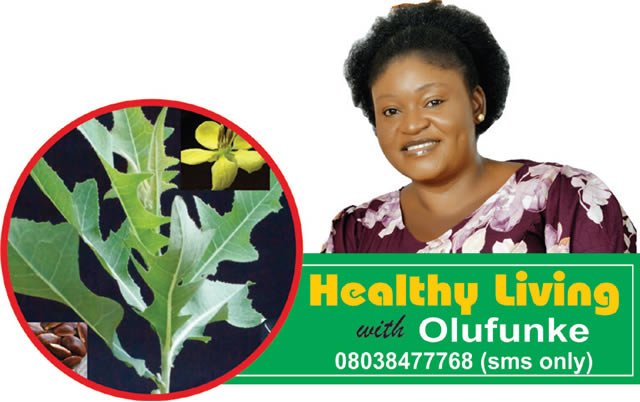
Many readers have asked me what the plant on my logo is. I will address it today. It is Launaea taraxacifolia known as efo yanrin in Yoruba and I already discussed it while on the vegetables of our land series. It is always confused with Dandelion. Taraxacum officinale is Dandelion. However, both vegetables are in the same family. I make sure that I explain how you can prepare everything I discuss for consumption but I still get several text messages from people who want me to explain to them again. This is a pointer to the fact that some people do not read thoroughly. Please, always do. It is not convenient to start explaining everything I have written to individuals.
A friend shared the story of how a woman treated her fibroid with me recently. She told me that the woman gave her a specific date to come to be checked after the completion of the herbs given to her. My friend returned to the woman. She was checked and she told me the woman jumped for joy and said “owo ti ba!” meaning “the herbs have hit the fibroid.” Out of curiosity, I asked what the herbal preparation given to her looked like and she told me she recognised lime and unripe pineapples among the things. As soon as she mentioned pineapples, I smiled. The reason is because like I once wrote, pineapples contain a protein-digesting and a meat- tenderizerising enzyme called bromelain. Some researches have even shown that bromelain can be a blood thinner and also a blood clot breaker. The pineapples contributed greatly to the melting of that fibroid. Though the woman does not know what bromelain is, the truth is that people like her will remain relevant in the development of knowledge about plants because they are the custodian of the genetic resources of plants. Most of the research in the area of Ethnobotany has benefited from the indigenous knowledge of people like her. This is the kind of thing that medical science should look into. Women do not have to go under the knife to remove their fibroids if there is an alternative in nature. If you have a relation who has knowledge about herbs, please get notebooks to write things down. This generation and the ones to come need them.
This week, it is the turn of potato peels. Traditionally, potato peel is used for producing low-value animal feeds and fertiliser. By various procedures such as fermentation, extraction and other treatments, it can ensue into products such as bio-fuels, dietary fibre, biofertiliser, biogas, biosorbent, antioxidants and food additives. It has antibacterial, apoptotic (Apoptosis is the process of programmed cell death. It is used during early development to eliminate unwanted cells), chemopreventive and anti-inflammatory properties. It contains about 40-50 per cent dietary fiber and has been considered as a new source of dietary fiber in bread making. In addition to these, it is a rich source of phenolics and a fair source of vitamins like riboflavin, ascorbic acid, folic acid and vitamins B6, iron, calcium, potassium and other nutrients. It is good for skin problems such as dark circles, acne, blackheads and whiteheads. You can use it to brighten the skin and also reduce excessive oil. They do not have fat and cholesterol, so they are an ideal food for people trying to lose weight.
Potato peels as burn dressing have been a natural home remedy for a long time. It is interesting to know that science backs this up. The peels can be made into flour which can be used for thickening sauces and lightening baked goods. It can be used to brew alcohol. Potato peels are already thinly sliced and thus the perfect candidates for home made crisps, crackers and fries. You can replace breadcrumbs in recipes with the potato peel preparation.
“The potato skins prevent loss of nutrients in potatoes,” says Vivian Nambooze, a nutritionist at Nutri Dietetic Centre Uganda. In reiteration, Jamiru Mpiima, a nutritionist at Family Nutritionist Uganda, says that leaving potato skins on a potato prevents leaching of nutrients found within the food. “Especially if the potatoes are going to be boiled as the nutrients lie just beneath the potato,” he adds. Mpiima warns that not all varieties of Irish potatoes are nutritious. He further says, “those with green skins contain a high percentage of anti-nutrients, which are chemicals in foods that hinder digestion and absorption of certain nutrients”. It is advisable to peel off the skin of such varieties of potatoes.
Some benefits of potato peels
- Protects against cancer
- Boosts immunity
- Lowers blood cholesterol
- Lowers risk of heart disease
- Maintains blood sugar levels
- Good for skin burns
- Lightens dark spots
I stumbled on a study while preparing for this article. It is so funny that Irish potato peels (IPP) can increase sperm count. Twenty male Wistar rats (100-120 g) were randomly allocated to two dietary treatment groups. Group A (control) were fed a commercial rat concentrate while Group B rats were fed a processed Irish potato peel diet for 2 weeks. Significant enhancement of sperm motility, livability and sperm count was observed in the IPP-fed rats compared to the control group. Let us see more scientific studies:
In a study titled, “Sweet potato peels and cancer prevention,’’ by Oluyori et al, it was found that sweet potato peels, which are usually discarded as waste, contain constituents that can serve as dietary components to prevent the development of different types of cancer.
Antioxidant and antimicrobial substances were extracted from potato peels by using different solvents (water, methanol and ethanol) in a study titled, “Evaluation of potato peel extract as a source of antioxidant and antimicrobial substances,’’ by Helal et al, PPME (Potato peel methanol extract) at 400 ppm was more effective in inhibiting both gram-positive and gram-negative bacteria and C. albicans than ampicillin.
In a study titled, “Protective effect of sweet potato peel against oxidative stress in hyperlipidemic albino rats,’’ by Althwab et al, sweet potato peel had the highest antioxidant activity compared to other parts. It can be concluded that the antioxidant components in purple sweet potato peel when administered with fermented cow’s milk can improve serum lipid status in rats fed a high fat diet.
In a study titled, “Potato peels: A source of nutritionally and pharmacologically interesting compounds–A review,’’ by Schieber et al, potato peels are said to contain a number of nutritionally and pharmacologically interesting compounds such as polyphenols and glycoalkaloids which may be recovered and used as natural antioxidants and precursors for steroid hormones.
In a study titled, “Potato peel waste, its nutraceutical, industrial and biotechnological applications,’’ by Javed et al, the conclusion is that potato peels waste, by various procedures such as fermentation, extraction and other treatments, can ensue into the products such as bio-fuels, dietary fibre, biofertiliser, biogas, biosorbent, antioxidants and food additives.
If you are looking to get the most nutrition out of your sweet and Irish potatoes, keep the peels on.
Copyright PUNCH.
All rights reserved. This material, and other digital content on this website, may not be reproduced, published, broadcast, rewritten or redistributed in whole or in part without prior express written permission from PUNCH.
Contact: [email protected]





